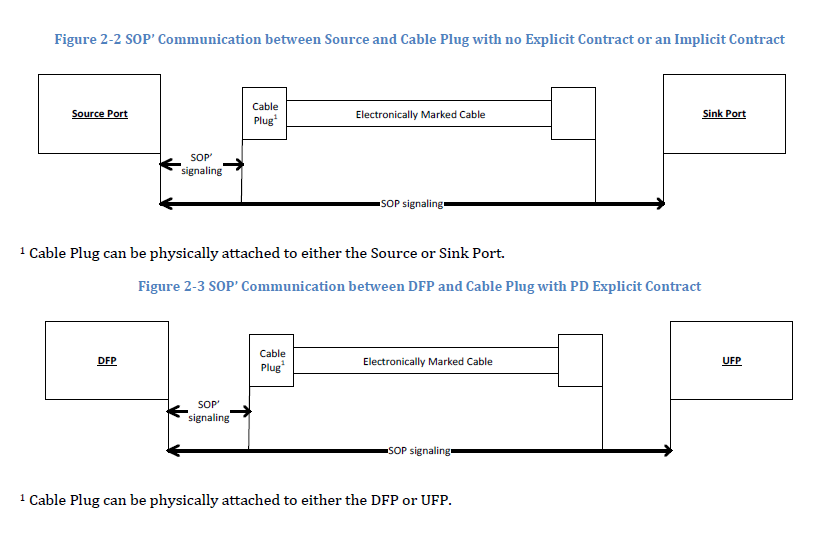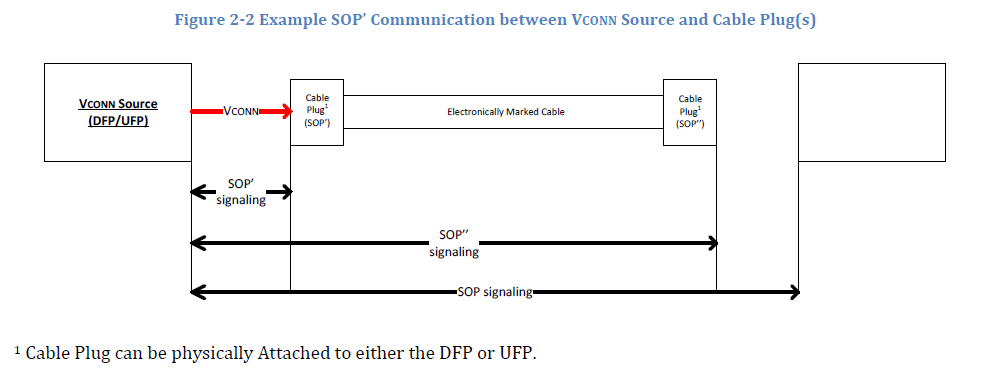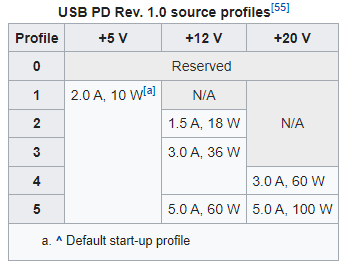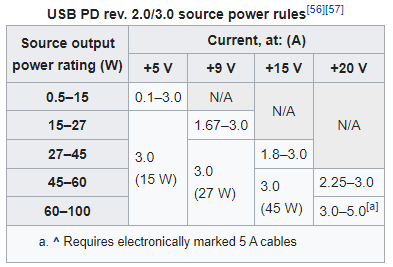USB Power Delivery Specification
Wikipedia link USB Power delivery
Informations
In July 2012, the USB Promoters Group announced the finalization of the USB Power Delivery (PD) specification (USB PD rev. 1), an extension that specifies using certified PD aware USB cables with standard USB Type-A and Type-B connectors to deliver increased power (more than 7.5 W) to devices with greater power demands. Devices can request higher currents and supply voltages from compliant hosts – up to 2 A at 5 V (for a power consumption of up to 10 W), and optionally up to 3 A or 5 A at either 12 V (36 W or 60 W) or 20 V (60 W or 100 W). In all cases, both host-to-device and device-to-host configurations are supported.
The intent is to permit uniformly charging laptops, tablets, USB-powered disks and similarly higher-power consumer electronics, as a natural extension of existing European and Chinese mobile telephone charging standards. This may also affect the way electric power used for small devices is transmitted and used in both residential and public buildings. The standard is designed to coexist with the previous USB Battery Charging specification.
The first Power Delivery specification defined six fixed power profiles for the power sources. PD-aware devices implement a flexible power management scheme by interfacing with the power source through a bidirectional data channel and requesting a certain level of electrical power, variable up to 5 A and 20 V depending on supported profile. The power configuration protocol uses a 24 MHz BFSK-coded transmission channel on the VBUS line.
The USB Power Delivery specification revision 2.0 (USB PD Rev. 2.0) has been released as part of the USB 3.1 suite. It covers the USB-C cable and connector with a separate configuration channel, which now hosts a DC coupled low-frequency BMC-coded data channel that reduces the possibilities for RF interference. Power Delivery protocols have been updated to facilitate USB-C features such as cable ID function, Alternate Mode negotiation, increased VBUS currents, and VCONN-powered accessories.
As of USB Power Delivery specification revision 2.0, version 1.2, the six fixed power profiles for power sources have been deprecated.[66] USB PD Power Rules replace power profiles, defining four normative voltage levels at 5 V, 9 V, 15 V, and 20 V. Instead of six fixed profiles, power supplies may support any maximum source output power from 0.5 W to 100 W.
The USB Power Delivery specification revision 3.0 defines a programmable power supply (PPS) protocol that allows granular control over VBUS power in 20 mV steps to facilitate constant current or constant voltage charging. Revision 3.0 also adds extended configuration messages and fast role swap and deprecates the BFSK protocol.
As of April 2016, there are silicon controllers available from several sources such as Texas Instruments and Cypress Semiconductor. Power supplies bundled with USB-C based laptops support USB PD. In addition accessories are available that support USB PD Rev. 2.0 at multiple voltages.
The Certified USB Fast Charger logo for USB Type-C charging ports On 8 January 2018 USB-IF announced “Certified USB Fast Charger” logo for chargers that use “Programmable Power Supply” (PPS) protocol from the USB Power Delivery 3.0 specification.
Communication
Rev 2

Rev 3

Summary
- First Release date: July 2012.
- Connectors: Standard Type A SuperSpeed, Standard Type B SuperSpeed, , Micro A SuperSpeed, Micro B SuperSpeed, Micro AB SuperSpeed, Type C
- Current: 1.5A to 5A
- Voltage: 5V to 20V
- Power: 7.5W to 240W
- Signal: 5V DC to 20V DC
| Specification | Current | Voltage | Power (max.) | Emarker |
|---|---|---|---|---|
| Battery Charging (BC) 1.1 | 1.5A | 5V | 7.5W | No |
| Battery Charging (BC) 1.2 | 5A | 5V | 25W | No |
| Power Delivery 1.0 Micro-USB | 3A | 20V | 60W | No |
| Power Delivery 1.0 Type-A/B | 5A | 20V | 100W | Yes |
| Power Delivery 2.0/3.0 Type-C | 5A | 20V | 100W | Yes |
| Power Delivery 3.1 Type-C | 5A | 48V | 240W | Yes |
Power

